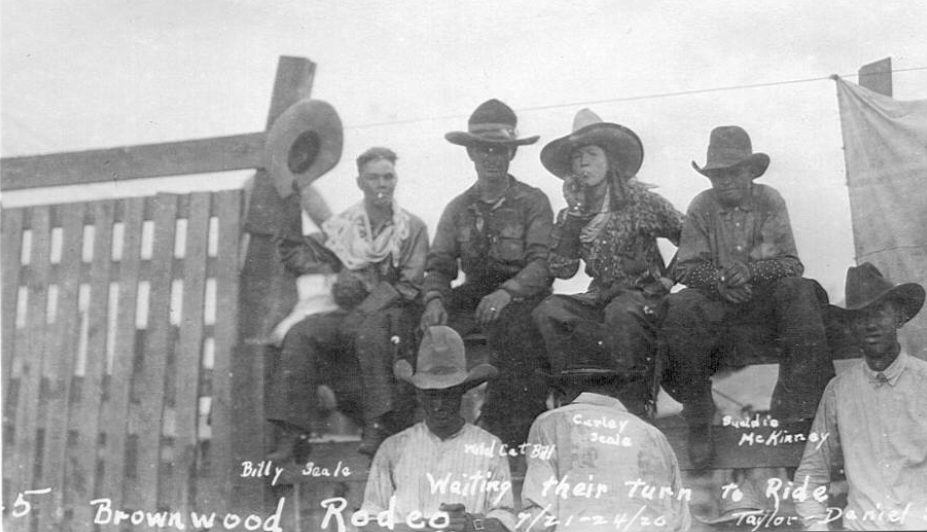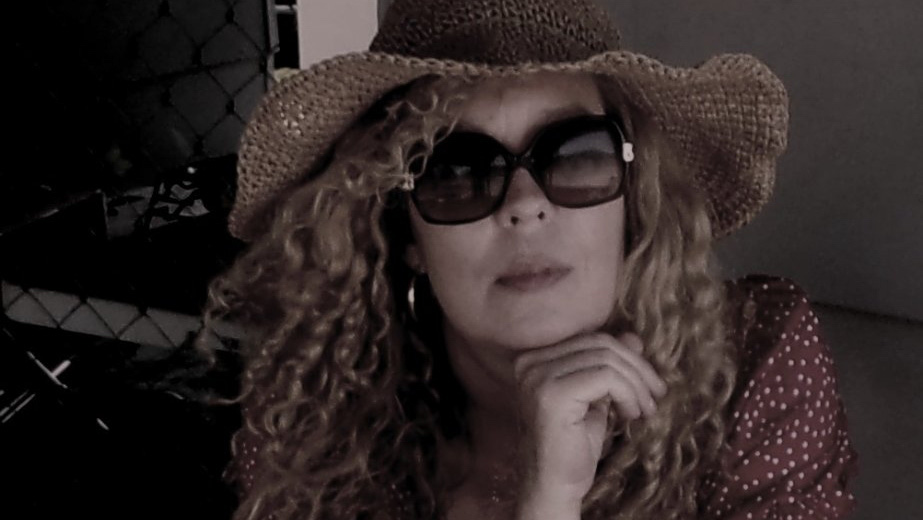
At the Brownwood Rodeo in 1920, Curley Seale, one of two hard riding sisters from the Seale Ranch in Baird, captured the heart of the crowd, and first money, at the steer riding competition. In 1920 this must have been a pretty sensational piece of news. The photo above was taken at the event, and captures Curley and her older sister Billie sitting on a fence, waiting their turn to ride. They’re wearing jeans, bandanas and hats, and both are smoking cigarettes. Standing with them is the rodeo star of the day, Wild Cat Bill.
Curious about these two horsewomen in this unusual photo, I sat down to dig up as much as I could about them. What I found is sure interesting, some of it might even be a bit strange. The Brownwood Bulletin published a blurb on the 1920 rodeo event that reads. “The Steer Riding features were very fine, and the highest honors in this respect were awarded by the great audience to Misses Billie and Curley Seale of Baird, Texas.”
Billie Seale, born Francis Lorraine, and Curley, born Ella Moore, were the daughters of horseman, rancher and banker Christopher Columbus Seale and his wife Ella, who owned a large ranch in the now defunct town of Belle Plain in Callahan County. Christopher Seale raised and trained horses and passed that knowledge on to his daughters.
In an article published in the Baird Star in 1937, a description of the Seale Ranch reads, “The original house was built by Mr. and Mrs. Parvin from Philadelphia, Pa. The house has been improved and today it is the palatial ranch home of Miss Frances Loraine Seale and Miss Elamore [sic] Seale, who own and operate the ranch. They are the two youngest daughters of Mr. and Mrs. Chris Seale, deceased. The ranch is famous for its good cattle and thoroughbred cowponies that jump hurdles, flaming hoops and cars. The Seale girls come from one of Texas’ early families. Their grandmother Seale swam a horse across the Brazos River and carried her three children to safety during an Indian raid, and is listed among the outstanding pioneer women of Texas.”
The Spokane Daily Chronicle stated on July 31, 1925, that no men were allowed on the Seale Ranch when it was run by the Seale sisters. The article goes on to describe the operation: “It was in 1918, after the death of their father, C. C. Seale, banker and ranchman of this section, that his two younger daughters conceived the idea of managing this property alone. An older sister assists in the housekeeping. Their mother died in 1914. While this ranch is a small piece of property as ranches are considered in Texas, nevertheless it was a pretty big proposition for two girls to tackle. […] It is the avowed purpose of these Texas girls to perpetuate the spirit and ideals of the frontier days of the old west. No horse is too wild for Bill and Curley to break. Busting broncos is one of their specialties, and they tackle the animals in true Buffalo Bill style. When it comes to roping cattle, the most expert lariat thrower has nothing on them. Riding herds, branding cattle and rounding up steers are all in the day’s work for these young women.”
In the 1920s, there were no women’s events in rodeo. Cowgirls were welcome to compete however, and many were riding broncs along with the cowboys at rodeos across Texas and the US up until the mid 1930s, when women were barred from most events. Both Seale women were frequent sights at Texas rodeos during the 1920s and 30s.
The Coleman Chronicle records Curley Seale participated in ladies flag races at the Coleman Rodeo as late as 1945, where she was described as an expert rider with a penchant for wearing colorful costumes. There is a record of Billie Seale crowning a rodeo queen in San Angelo in the 1930s. Billie Seale was known locally as a fine painter, and Curley played piano. Neither Seale sister ever married, and both women are buried at the Belle Plaine Cemetery. They might not have been official rodeo queens of the 1920 Brownwood Rodeo, but surely were true ones.
***
Diane Adams is a local journalist whose columns appear Thursdays on BrownwoodNews.com
